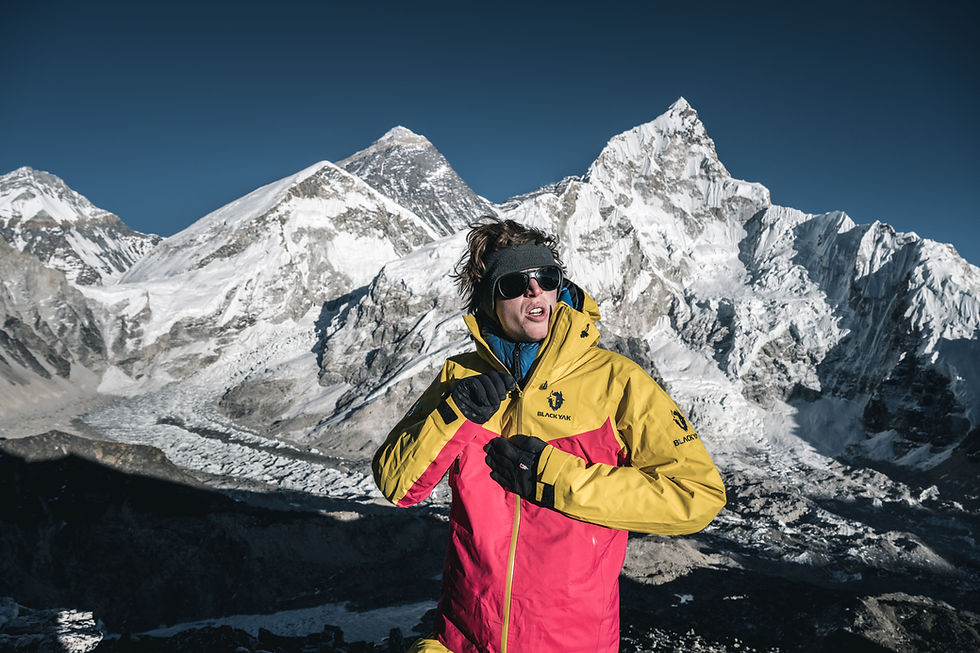Facing Life’s Avalanches: An Extreme Mountaineers Take on Men's Mental Health.
- meaningofmenpodcas
- Jan 28, 2025
- 4 min read

In this episode of The Meaning of Men, I had the pleasure of speaking with extreme mountaineer Jost Kobusch, the day before his latest attempt to climb My Everest!
We delved into the mental fortitude required to navigate the treacherous world of high-altitude expeditions and explored how those experiences mirror the struggles many men face in their own mental health journeys.
His personal narrative offers profound lessons on how to handle stress, isolation, and even the fear of failure—lessons that resonate deeply when discussing mental health awareness and depression in men.
Through his incredible mountaineering career, Jost has learned the value of self-reflection, vulnerability, and maintaining a grounded sense of self, even in the most extreme conditions. These insights are not only invaluable to climbers but to anyone navigating life’s challenges. Let’s explore how Jost's experiences can offer a fresh perspective on how men can deal with their mental health.
1. Living Without Regret: A Powerful Mental Shift
Jost’s near-death experience in 2015, when he survived an avalanche on Mount Lhotse, was a pivotal moment in his life. His ability to face that peril with peace and acceptance of whatever might come, whether life or death, reshaped his view on risk and success. He realised that living without regret was more important than achieving perfection. This mental shift speaks directly to the mental health struggles many men face: the pressure to always succeed, the fear of failure, and the emotional toll of pushing through life without taking time to assess our own well-being.
By embracing the journey over the destination, Jost found clarity, a concept that can help men overcome depression and the anxiety of never feeling 'enough.' Understanding that mental health isn’t just about pushing through but about learning from each moment can be a crucial step in developing a healthy mindset.
2. The Power of Detaching From Outcomes
When Jost climbs, he doesn't focus on the summit or the success of the climb. Instead, he immerses himself in the process, detaching from expectations. This approach has helped him maintain mental clarity in extreme environments, where the pressure to succeed could be overwhelming. For many men, societal pressure to "win" or "succeed" often leads to poor mental health outcomes, such as depression in men, as they feel they are constantly falling short of expectations.
Jost’s approach of embracing the journey without focusing on an outcome is a powerful mental health tool. It teaches that there’s value in just showing up, in doing your best without attaching your worth to the end result. This mindset can reduce the immense pressure many men face to always succeed and can lead to better mental health and resilience.
3. Facing Fear as a Tool for Growth
Fear is an inevitable part of Jost’s life, whether in the face of avalanches or solo climbs in extreme conditions. However, he uses fear as a tool for growth, understanding that it is in the 'orange zone' of fear—where focus and motivation are heightened—that true progress occurs. For many men, fear is a barrier; it holds them back from being vulnerable, expressing emotions, or even seeking help for mental health struggles.
Jost’s perspective on fear teaches that fear doesn’t have to be avoided; rather, it can be used to fuel growth. By embracing fear, men can learn to navigate mental health challenges more effectively, allowing them to face tough emotions head-on rather than suppressing them, which can lead to depression or emotional withdrawal.
4. Cultivating Mental Strength Through Solitude
Jost has spent weeks alone in polar winters, relying on his ability to enter a meditative state to maintain mental clarity. In such extreme conditions, he's learned to shut down emotions and focus purely on survival. This process has allowed him to perform efficiently under immense stress. For many men, isolation is a difficult but often necessary experience, especially when struggling with depression or feelings of loneliness.
Jost’s ability to thrive in solitude shows that, although isolation can be incredibly challenging, it can also be an opportunity for personal growth. Men often struggle with loneliness, especially in today’s society where close male friendships are on the decline. Learning to be comfortable with solitude can provide the space needed to reflect, process emotions, and emerge stronger—skills crucial for navigating mental health challenges.
5. Redefining Masculinity Through Mountaineering
Mountaineering, traditionally seen as a symbol of rugged masculinity, has evolved in Joost’s life to be about respecting one’s boundaries and embracing vulnerability. His approach challenges the traditional masculine ideals of toughness and invincibility, focusing instead on resilience, self-awareness, and openness. For many men, societal expectations around masculinity can be a source of immense pressure, often contributing to depression in men when they feel they can't meet those standards.
Jost’s journey highlights that true strength lies in vulnerability and the ability to recognise and honour one’s limitations. It’s this shift in perspective that can ultimately help men improve their mental health by realising that asking for help or showing weakness is not a failure—it’s a form of strength.
In Summary
Jost's experiences on the world’s most dangerous peaks provide invaluable insights into mental health, masculinity, and the importance of emotional resilience. His approach to overcoming extreme challenges—whether on Everest or in everyday life—offers lessons in vulnerability, fear, and personal growth that every man can learn from.
As we continue to raise mental health awareness, it’s crucial to redefine what it means to be a man in today’s world. Jost’s story reminds us that real strength isn’t about pushing through pain or avoiding emotions; it’s about embracing life’s challenges with an open heart, learning from every experience, and seeking support when needed. By doing so, we can all become better versions of ourselves, no matter the climb.



Comments